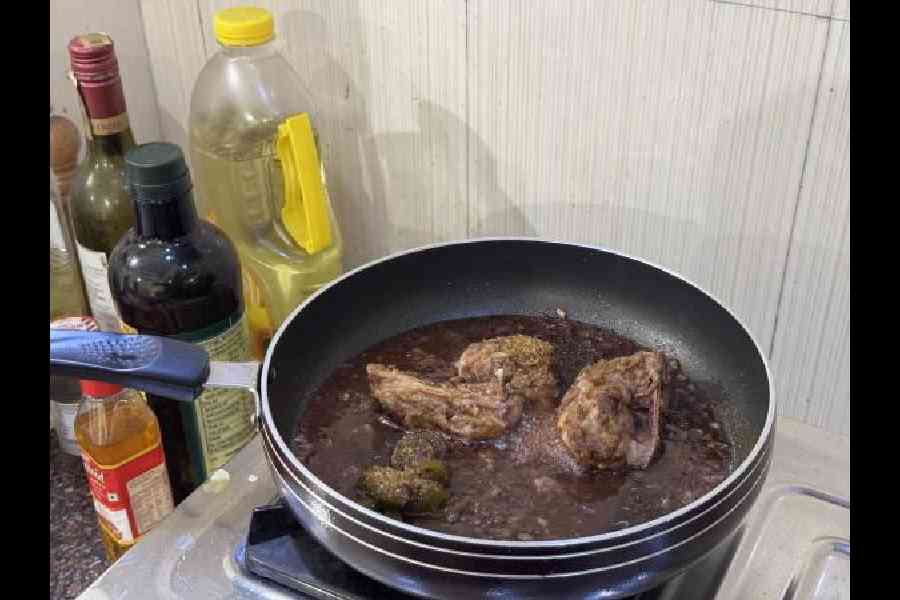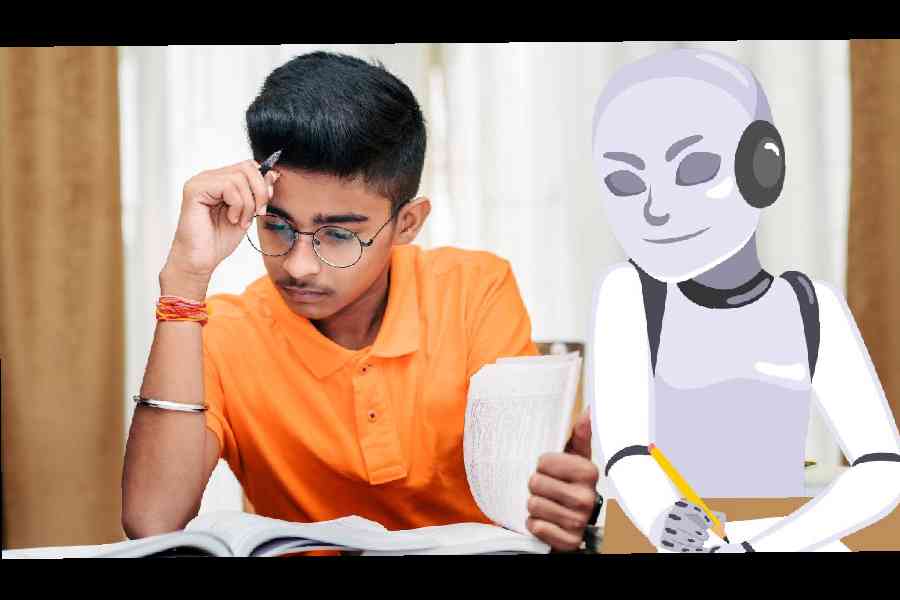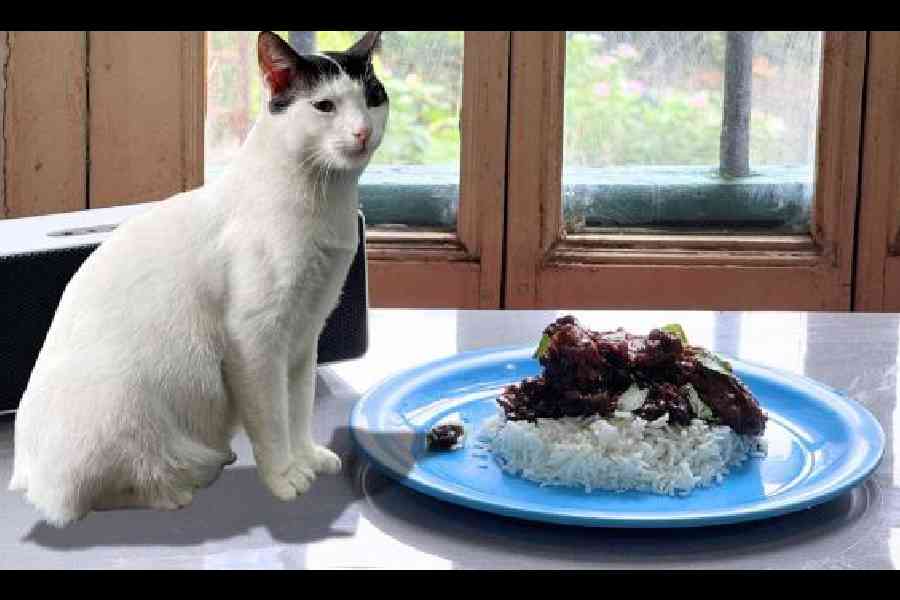Saturday afternoon was spent e-leafing through the e-book The Ultimate Crockpot Cookbook for Beginners by Teresa J. Blair. I judged the Rs 449 book by its cover featuring roasted potatoes with a few slices of lemon neatly placed in the centre of the bowl, surrounded by a sprinkle of parsley. I bought the e-book.
The recipe for afternoon lunch was Mama’s Mojito Chicken, prepared with rum, lime juice, lime zest, onions and a good helping of sugar. Thrown into the mix: cayenne pepper, jalapeno, cumin and cinnamon.
What could go wrong? My house doesn’t have any thick carpeting. It was needed to muffle the screams after having a spoon of the 25 minutes of wasted time standing by the stove.
The problem is, of course, the book. However, a bigger problem is perhaps the author — Teresa does not exist. She has written a few books on crock pot cooking, canning and preserving, Mediterranean diet and an “anti-inflammatory cookbook”, all available as e-book versions. There is no author introduction or photographs accompanying the recipes but there are 91 pages of Teresa in the book that I purchased. The problem doesn’t end there: The book delivers recipes with ‘mojito’ in almost all the titles. It was a rude welcome to the world of AI-generated books and authors.
Teresa promised me, through the book’s description, “hearty stews and tender roasts to flavourful soups and savoury casseroles” that are “designed to elevate your everyday dining experience” and of “returning home to a kitchen filled with the aroma of a perfectly slow-cooked meal”.

Mama Mojito Chicken is being prepared
The experience has given me the opportunity to play around with a saying: A lying AI recipe can travel halfway around the world while Jamie Oliver is still turning on the stove.
AI-generated stories are around us
The AI revolution hasn’t been lo-fi at all. First, it was science fiction magazines that felt the brunt of artificial intelligence.
In January last year, the desk of Asimov’s Science Fiction, which started printing in 1977, received a story titled The Last Hope. It went through the scalpel of the subeditor without raising an eyebrow. Soon after another story came in, also titled The Last Hope, making the subeditor curious. And then another one with the same title but written by a different “author”. According to the magazine, it had received over 20 short stories, all titled The Last Hope but with different author names and from different email addresses.
Something similar was experienced at Clarkesworld Magazine and the Magazine of Fantasy & Science Fiction (around since 1949). Clarkesworld, which has published writers including Jeff VanderMeer, Yoon Ha Lee and Catherynne Valente, had stopped taking pitches because of the number of AI-generated stories that were coming in.
Writers — like soldiers — won’t die but they certainly have to sandpaper their skills or prepare to succumb to AI tools like Sudowrite. Built on OpenAI’s language model, it’s a tool meant for fiction writers who can copy-paste what they have already written, followed by highlighting some words. AI takes over and proposes twists and turns or generates more descriptions.
Take the case of AI researcher Melanie Mitchell, who published Artificial Intelligence: A Guide for Thinking Humans in 2019. She wanted to talk about AI’s impact but a few years later, an AI-generated imitation of her book appeared on a popular e-shopping platform. Mitchell posted on X (formerly Twitter) in January: “The ‘sample’ on Amazon reads like a ChatGPT summary of my book (with some small post-editing).”
Recognising AI-generated cookbooks
As a home cook, I had problems with a recipe from an AI-authored book but for the food industry, AI comes with a few upsides. According to McKinsey’s 2022 Global Survey on AI, the technology is becoming more prevalent in the food industry.
There is a company in Israel called Tastewise, which is like London’s BlackSwan, and it can make sense of data points. It has helped Waitrose, a brand of British supermarkets, identify popular flavours and has helped it “create” a top-selling “own-label dish”.
The Internet is packed with millions of blogs and social media posts containing recipes and food photos, allowing different AI models to offer “duplicates” with a twist. But these twists don’t always go down well.
In February, San Francisco grocery-delivery service Instacart was in the news for using AI-generated images of food. And AI-generated recipes are not always relying on strong sources. So one may end up with, for example, undercooked chicken, or AI-produced books on mushroom foraging can go wrong.
The e-book I picked up has “crockpot” in the title. Now, a crock pot is a slow cooker and it has been designed to heat food for several hours. The recipe I tried makes no mention of using a crock pot. Some of the other recipes in the book are “ginger-mint mojitos”, “hornswaggle peveryy keen ginger mojito [sic]” and “mojito scones”. Yes, this is a terrible book with “mojito” plastered everywhere.

The Internet has millions of blogs and social media posts containing recipes and food photos, allowing different AI models to offer “duplicates” with a twist
If possible, read a sample of the e-book before making a purchase. You will easily spot missing words, grammatical missteps and clunky phasing, besides errors with key ingredients.
Even if there is a picture of the author, look carefully. At times, the shoulder is missing or the skin texture will give away the AI at play. AI “authors” tend to have no history besides a few e-books. And some of these books come with reviews. Go through them carefully: Plenty of the reviews appear on the same date with almost the same phasing. And next time you read a recipe somewhere, try to look for a phrase like: “We have cooked this recipe before presenting it before you.” Not that you will be safe after reading the message but there is a chance of ending up with a safe recipe.
What does this mean? The Internet is being flooded with content that’s as true as my professed singing skills. There will come a time — and it’s not far away — when quality means a paywall and, second, search engines will index sites from “trusted” content providers.
How to spot AI-generated recipes/books
Download a sample before buying an e-book
Make sure the author has a bio that goes beyond the book you’re purchasing
Look at author pictures closely for missing shoulder or skin tones that appear AI-generated
Reverse search bio pictures to see where else these photos have been featured
Go through a few recipes for grammatical errors and clunky phrasing
Make sure the ingredients mentioned are in the ‘method’ section
Check if measurements are off the radar
Where is it leading to?
The better websites will go behind a paywall to protect content
Search engines will begin indexing only trusted websites
e-book sellers need to up their game of how a book gets listed
What does it mean for new authors?
They will be required to prove their credentials by putting out interviews in newspapers and magazines
They will have to compete with AI tools to “churn” out books, just to keep pace with AI “written” book flow
They need strong editors to ensure books are free of grammatical errors
What does it mean for the reader?
In the case of cookbooks, they will tend to stick to titles that are already popular
They will buy cookbooks by popular authors
Online recipes need to come with videos to prove that it can be cooked










